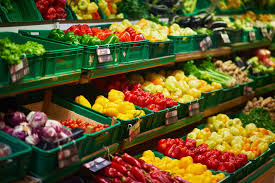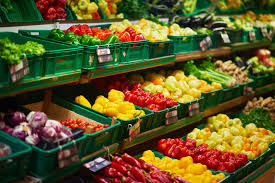
According to warnings from British experts, the country could see a spike in food prices "for some time to come" because of the ongoing heat wave even as Londoners prepare for a continued summer blast and temperatures expected to be around 32 degrees Celsius.
There has been pressure on producers because of prolonged weeks of hot weather accompanied by an increase in demand for some specific types of products because of social summer events such as the World Cup, said Helen Dickinson, the British Retail Consortium chief executive.
In July, food inflation was at 1.6 percent compared to the May and June figure of 1.2 percent according to press reports.
In many parts of Britain, lakes have begun to dry up because of the heatwaves and rare rain fall.
"We expect this period of food price inflation to continue in coming months as, despite global oil, food and commodities prices shrinking recently, the hot, dry conditions mean the pressure on prices will continue for some time to come," Dickinson said.
There was increase in prices to consumers in November last year because of shortage of supply in staple foods such as bread and potatoes, milk and meat because of the impact of the two-month drought and heatwave throughout the UK.
For many areas of the country, here would be little respite from the heat even though there have been thunderstorms and heavy rains in the east. The extreme conditions have led to perched fields and struggling livestock struggle in the extreme conditions.
It was common to have a 10 percent reduction in milk yield but "there is still plenty of milk around", said Tim Mead of the organic dairy company Yeo Valley.
Lower fodder supplies and very little grass has resulted in the beef market taking a hit and reduction in confidence in the market, said George Dunn, chief executive of the Tenant Farmers Association.
"Store markets are well down in price, which may lead to shortages into next year," he warned.
Lack of straw, used for bedding is another problem for livestock farmers.
"Straw length is short because of the impact of the hot weather on the growth of wheat and barley, and straw was already in desperately short supply because of the previous year's wet harvest, said Zoe Davies, chief executive of the National Pig Association.
Liz Bowles, head of farming at the Soil Association said that it is not possible for retailers to just pick up cheaper food elsewhere because of the nature of the heatwave which is widespread and is now prevalent throughout Europe and beyond.
"Many food exporter regions around the globe are being affected, so we could see pressure on prices for consumers," she said.
This year’s climatic conditions could create hardships for thousands of rural families, warned farming leaders.
Here can be impact throughout the market because of vegetable shortage, said Jack Ward, chief executive of the British Growers Association. "As a broad generalisation, volumes (of crops harvested) will be down and for the majority of crops costs will be up."
He said that the next few months would be crucial. "Brassicas, such as broccoli and cabbage, are down in volume. With salad, growers are having difficulty just keeping the plants alive. But there is still time for potatoes to bulk up, and onions," he said. "That will depend on the weather in August and September."
(Source:www.xinhuanet.com)
There has been pressure on producers because of prolonged weeks of hot weather accompanied by an increase in demand for some specific types of products because of social summer events such as the World Cup, said Helen Dickinson, the British Retail Consortium chief executive.
In July, food inflation was at 1.6 percent compared to the May and June figure of 1.2 percent according to press reports.
In many parts of Britain, lakes have begun to dry up because of the heatwaves and rare rain fall.
"We expect this period of food price inflation to continue in coming months as, despite global oil, food and commodities prices shrinking recently, the hot, dry conditions mean the pressure on prices will continue for some time to come," Dickinson said.
There was increase in prices to consumers in November last year because of shortage of supply in staple foods such as bread and potatoes, milk and meat because of the impact of the two-month drought and heatwave throughout the UK.
For many areas of the country, here would be little respite from the heat even though there have been thunderstorms and heavy rains in the east. The extreme conditions have led to perched fields and struggling livestock struggle in the extreme conditions.
It was common to have a 10 percent reduction in milk yield but "there is still plenty of milk around", said Tim Mead of the organic dairy company Yeo Valley.
Lower fodder supplies and very little grass has resulted in the beef market taking a hit and reduction in confidence in the market, said George Dunn, chief executive of the Tenant Farmers Association.
"Store markets are well down in price, which may lead to shortages into next year," he warned.
Lack of straw, used for bedding is another problem for livestock farmers.
"Straw length is short because of the impact of the hot weather on the growth of wheat and barley, and straw was already in desperately short supply because of the previous year's wet harvest, said Zoe Davies, chief executive of the National Pig Association.
Liz Bowles, head of farming at the Soil Association said that it is not possible for retailers to just pick up cheaper food elsewhere because of the nature of the heatwave which is widespread and is now prevalent throughout Europe and beyond.
"Many food exporter regions around the globe are being affected, so we could see pressure on prices for consumers," she said.
This year’s climatic conditions could create hardships for thousands of rural families, warned farming leaders.
Here can be impact throughout the market because of vegetable shortage, said Jack Ward, chief executive of the British Growers Association. "As a broad generalisation, volumes (of crops harvested) will be down and for the majority of crops costs will be up."
He said that the next few months would be crucial. "Brassicas, such as broccoli and cabbage, are down in volume. With salad, growers are having difficulty just keeping the plants alive. But there is still time for potatoes to bulk up, and onions," he said. "That will depend on the weather in August and September."
(Source:www.xinhuanet.com)














